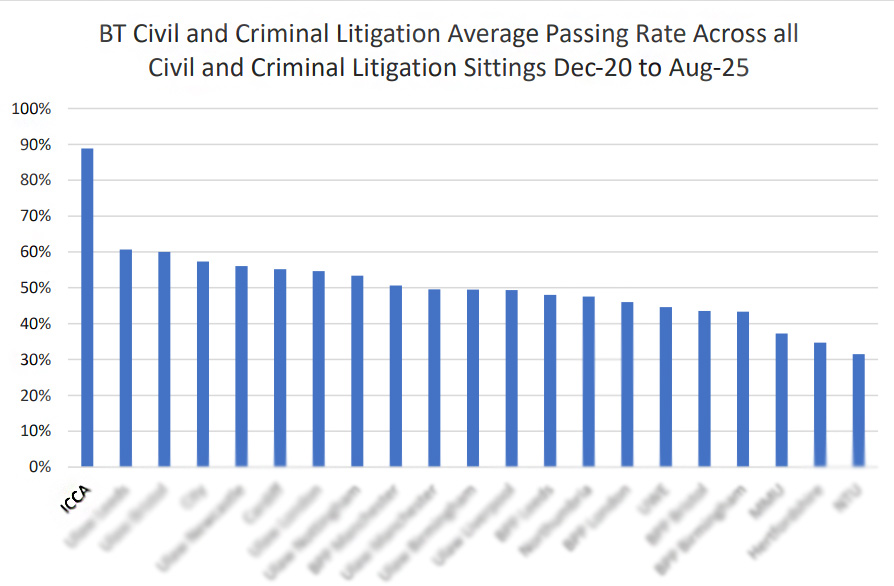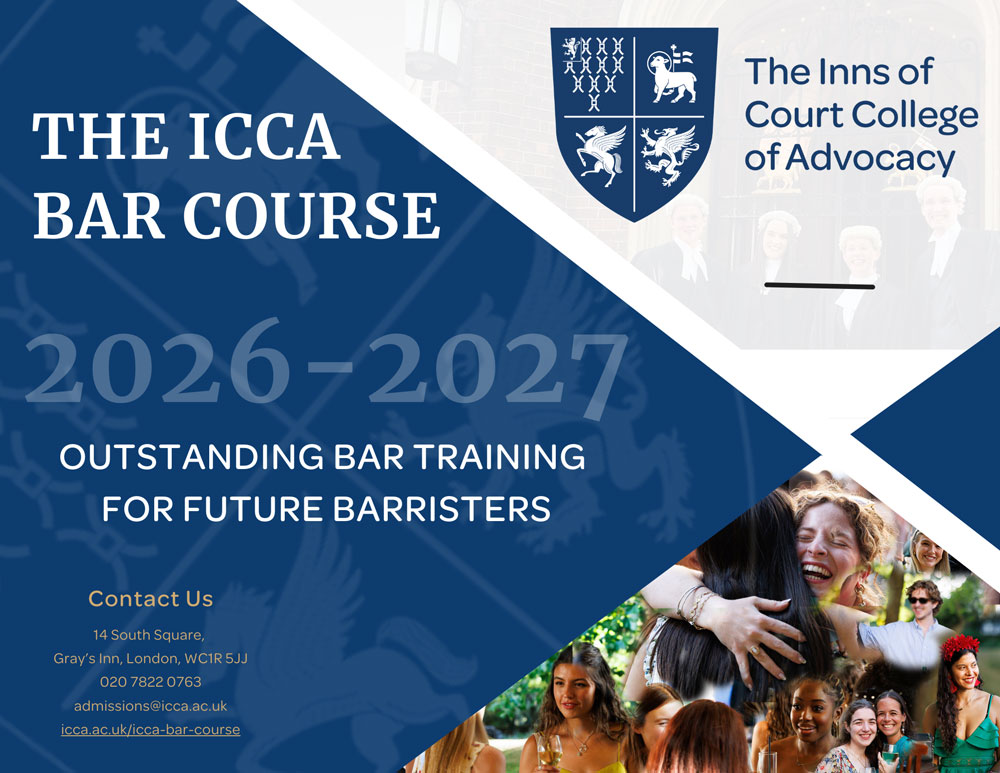About the ICCA Bar Course
Welcome to the ICCA Bar Course
“The ICCA has the highest average passing rate across both Litigation subjects and all sittings to date … The ICCA is, thus far, some way ahead of the other AETO centres in terms of cohort performance.” BSB Central Examinations Board Chair’s Report Part 2, 25 November 2025 (page 43)
Outstanding Bar Training for Future Barristers
Designed and taught by experienced barristers and educational specialists, the ICCA Bar Course is innovative, flexible and accessible, offering a learning experience of outstanding quality.
This Vocational Stage of Bar training will introduce you to many new skills. It is useful to think of the Vocational Stage as the bridge between academic study and practical work experience in pupillage or work-based learning.
You will be learning the procedural and practical aspects of civil litigation, alternative dispute resolution and criminal litigation, evidence and sentencing. You will learn the fundamental skills of advocacy, from making submissions to a judge to handling witnesses in examination-in-chief and cross-examination. You will be introduced to the skills utilised in conducting effective conferences with clients, to how to draft pleadings and to write legal opinions. You will be introduced to Professional Ethics, including the professional duties of barristers to the court and to their clients.
 The ICCA Bar Course is delivered in two parts using a combination of in-person teaching, e-learning, and self-study. Validated by King’s College London, the ICCA Bar Course is designed to equip you with the knowledge and vital practitioner skills required to achieve success in pupillage and then in professional practice as a barrister.
The ICCA Bar Course is delivered in two parts using a combination of in-person teaching, e-learning, and self-study. Validated by King’s College London, the ICCA Bar Course is designed to equip you with the knowledge and vital practitioner skills required to achieve success in pupillage and then in professional practice as a barrister.
Prospectus
For a quick and helpful overview, read our prospectus by clicking on the image below, or read on for further detail.
Course Structure
Part One
Online study for the BSB centrally set assessments
On Part One you will be studying for the Bar Standards Board (BSB) centrally set assessments of Civil Litigation, Evidence and Alternative Dispute Resolution (ADR) and Criminal Litigation, Evidence and Sentencing. Assessments are written and marked by the BSB (hence ‘centrally set’). You can choose to take your assessments in December, April or August.
Part One is delivered entirely online and commences in either September or January. Your learning is through self-study at your own pace or by following a guided pathway (over 12-14 weeks). There are no timetabled sessions or attendance requirements (save for assessments – see more below), so Part One can be studied at times to suit your personal circumstances and from any location.
You will experience interactive study, supported by regular self-testing after each module, a wealth of questions to continually test your understanding and multiple professional courtroom films demonstrating the practical application of the legal procedures you will be learning. You will have access to online forums for tutor and peer support and a number of pre-assessment revision webinars. Part One students are in regular communication with one another and are assigned a personal tutor for pastoral support. As a Part One student, you have full access to careers support and our considerable Careers Hub.
You will also be provided with (included in your fees) all the learning resources required, including a hardcopy of the White Book (2 volumes), e-book versions of Blackstone’s Criminal Practice, the Jackson ADR Handbook and access to Westlaw and LexisNexis legal databases.
Part One Modules and Assessments
You can read more below about the Part One course and the centrally set assessments. (If viewing on a mobile device, please turn to landscape view to read the tables.)
| Module | Mode | Assessment | % | Credit | Hours |
| Civil Litigation, Evidence and Alternative Dispute Resolution (ADR) | Self-study, online learning | Two BSB centrally set assessments (in person at assessment centre)
| 17.5% | 20 | 200 |
| Criminal Litigation, Evidence and Sentencing | Self-study, online learning | One BSB centrally set assessment (in person at assessment centre)
| 17.5% | 20 | 200 |
There are three opportunities each year to sit the BSB assessments: April, August and December. For example, if you start Part One in September, you can take your BSB exams in December, or the following April.
Online Assessments
Following the BSB announcement on 5 May 2023, all centrally set assessments from August 2023 must be taken in person. Online assessments are therefore no longer permitted by the BSB. Students who choose to sit overseas are responsible for finding a suitable venue, confirming its availability, and any costs related to sitting the Bar Standards Board assessments at an approved overseas venue. This includes, and is not limited to, invigilation costs and room hire, but does not include courier costs which will be covered by the ICCA. Any venue must be approved by the BSB before it can be confirmed.
Proceeding to Part Two of the ICCA Bar Course
When you have passed your Part One BSB centrally set assessments and joined an Inn of Court, you will be eligible to proceed to Part Two. You can read more about starting and progressing through the course on our ICCA Bar Course Commencement and Progression page.
Part Two
In-person teaching at the Inns of Court
Part Two is delivered in person over 17 weeks (March to July) or 19 weeks (September to January). All teaching takes place within the exceptional training facilities of the Inns of Court (Gray’s Inn, Inner Temple, Lincoln’s Inn and Middle Temple). You will have access to the Inns’ libraries for quiet study and will share your environment on a daily basis with members of the profession. All sessions are timetabled in small groups and taught by experienced barristers, with a focus on individual attention.
Having passed the knowledge subjects of Civil Litigation/ADR and Criminal Litigation on Part One, the focus of Part Two is the practical skills subjects of Advocacy, Conference skills, Drafting and Opinion Writing & Legal Research. You will also undertake an online Professional Ethics module to introduce you to the ethical standards and professional duties of barristers. All. modules are backed up with additional information and learning available through the VLE, including legal databases for research.
To commence Part Two you will have passed your centrally set assessments on Part One and joined an Inn of Court.
Please note that Part Two is an intensive full-time course in London for which there is an attendance requirement for timetabled classes. Classes are timetabled beween 9am and 4pm on Mondays to Thursdays (except for bank holiday weeks when attendance on a Friday may be required). Please bear this in mind when planning your finances and living arrangements. There is no online-only, hybrid or part-time option for Part Two.
Part Two Modules and Assessments
You can read more below about the Part Two modules and methods of assessment. (If viewing on a mobile device, please turn to landscape view to read the tables.)
| Module | Mode | Assessment | % | Credit | Hours |
| Advocacy All oral advocacy practice sessions are taught in small groups (Submissions, Examination-in-Chief and Cross-Examination) by experienced practitioners | In-person | Internal exams
| Examination-in-Chief – 17.5% Cross-Examination – 17.5% Submissions Advocacy –15% Total 50% | Examination-in-Chief – 14 Cross-Examination – 14 Submissions Advocacy –12 Total 40 | Examination-in-Chief – 140 Cross-Examination – 140 Submissions Advocacy –120 Total 400 |
| Opinion Writing and Legal Research | In-person | Internal exam Take-away written problem with a week to complete, maximum 4000 words plus legal research trail | 12.5% | 10 | 100 |
| Drafting | In-person and online | Internal exam 3-hour supervised assessment | 12.5% | 10 | 100 |
| Conference Skills Taught in small groups in double-length sessions | In-person | Internal exam Live conference undertaken with actor/client, 25 minutes and submission of conference plan | 12.5% | 10 | 100 |
| Professional Ethics | Online with in-person introduction | Internal exam Closed-book, multiple-choice, 40-question test lasting 2 hours | 12.5% | 10 | 100 |
Commencement Dates and Progression through the ICCA Bar Course
Please see our ICCA Bar Course Commencement and Progression page for further information.
Your Career Development
Throughout the course you can benefit from:
- Dean’s lectures, including visiting guest lectures from senior practitioners, barristers’ clerks and the judiciary spanning a diverse range of specialist practice and subject areas.
- One-to-one support from our experienced Careers Advisers, helping you to secure pupillage.
- Access to the ICCA Careers Hub, providing a wealth of advice from pupillage applications and interview preparation to the numerous areas of practice open to you.
- Joining the Advocacy Committee to enhance your advocacy skills and take part in external mooting competitions as an ICCA student.
- Joining the School Exclusion Project (by application) to gain practical advocacy experience and to assist children permanently excluded from state schools.
- Access to pro bono work experience with Advocate (previously the Bar Pro Bono Unit).
- Chambers-sponsored prizes and awards, including opportunities for mini-pupillage and one-to-one mentoring.
- A Bar Course respected by the profession and designed to be directly relevant to practice as a Barrister.
Wellbeing, Disability and Learning Support
As a welcoming, diverse and supportive community, we work closely with you to enable you to reach your full potential
- The ICCA has been awarded a Certificate of Recognition by the Bar Council for our commitment to the wellbeing of our students and bespoke wellbeing materials are embedded into the Bar Course.
- We provide bespoke learning and studying support, as well as personalised assessment arrangements, to support students with a disabilities and specific learning difficulties, or other temporary conditions that may affect learning, studying and assessment performance at the ICCA.
- You will also be allocated a personal tutor, your key contact to provide pastoral support throughout the course (Parts One and Two) and to guide and encourage you academically on Part Two.
- Our students have access to free 24/7 counselling services via Health Assured.
Course Award, Call to the Bar and Commencing Pupillage
On successful completion of the ICCA Bar Course, you will:
- Receive a Postgraduate Diploma (PGDip) in Bar Practice from King’s College London, our validating academic partner.
- Be eligible to be Called to the Bar of England and Wales (subject to meeting the qualifying session requirements of your Inn of Court and passing their ‘fit and proper person’ checks).
- Be able to commence pupillage or work-based learning, subject to acceptance for pupillage by your chosen pupillage provider.
Independence
Registration on the Bar Course of the ICCA confers no advantage in relation to Inns’ scholarships or awards, Inns’ membership, Qualifying Sessions or Call to the Bar. For more information see the Policy on Independence between the Inns of Court and the ICCA.

